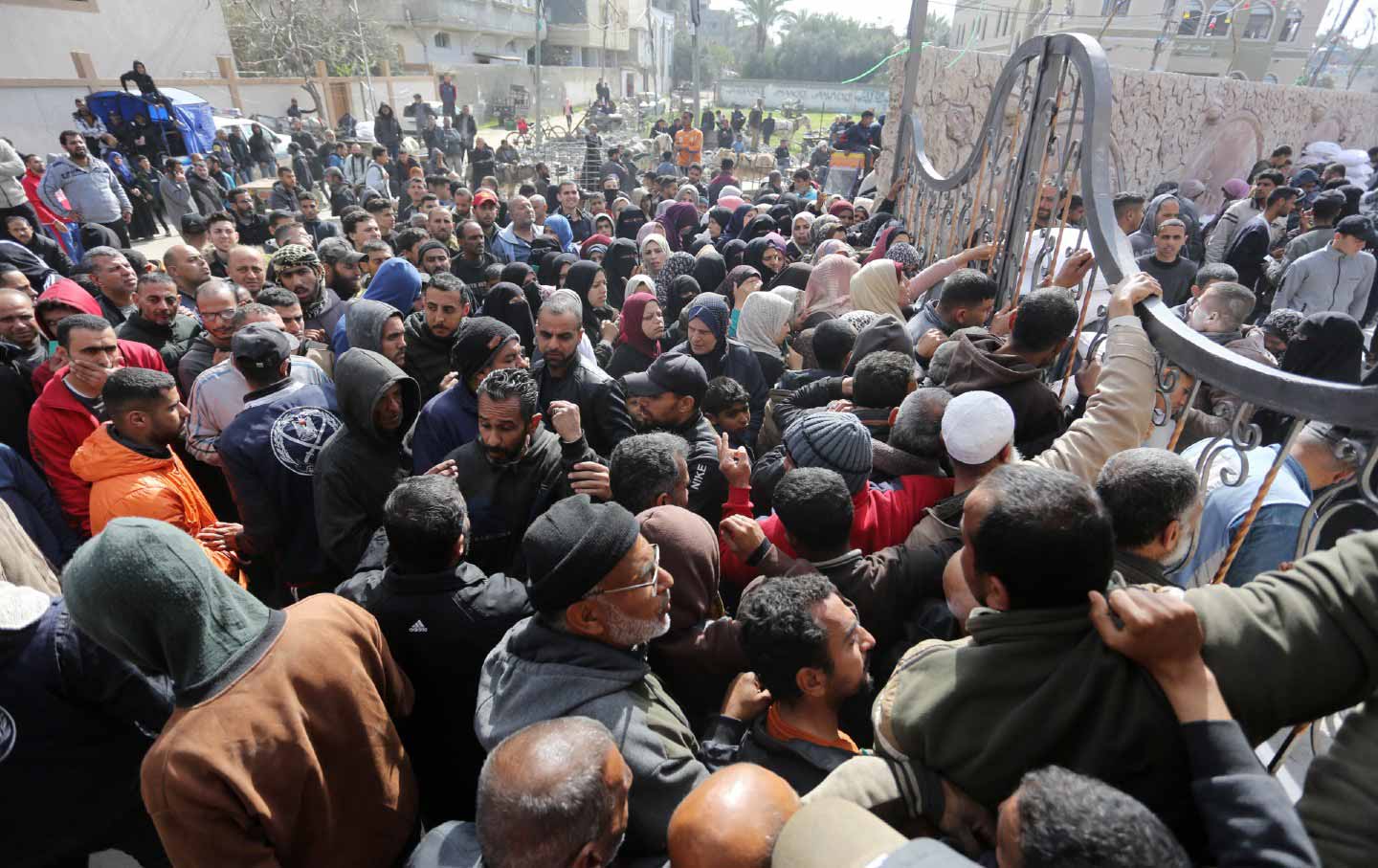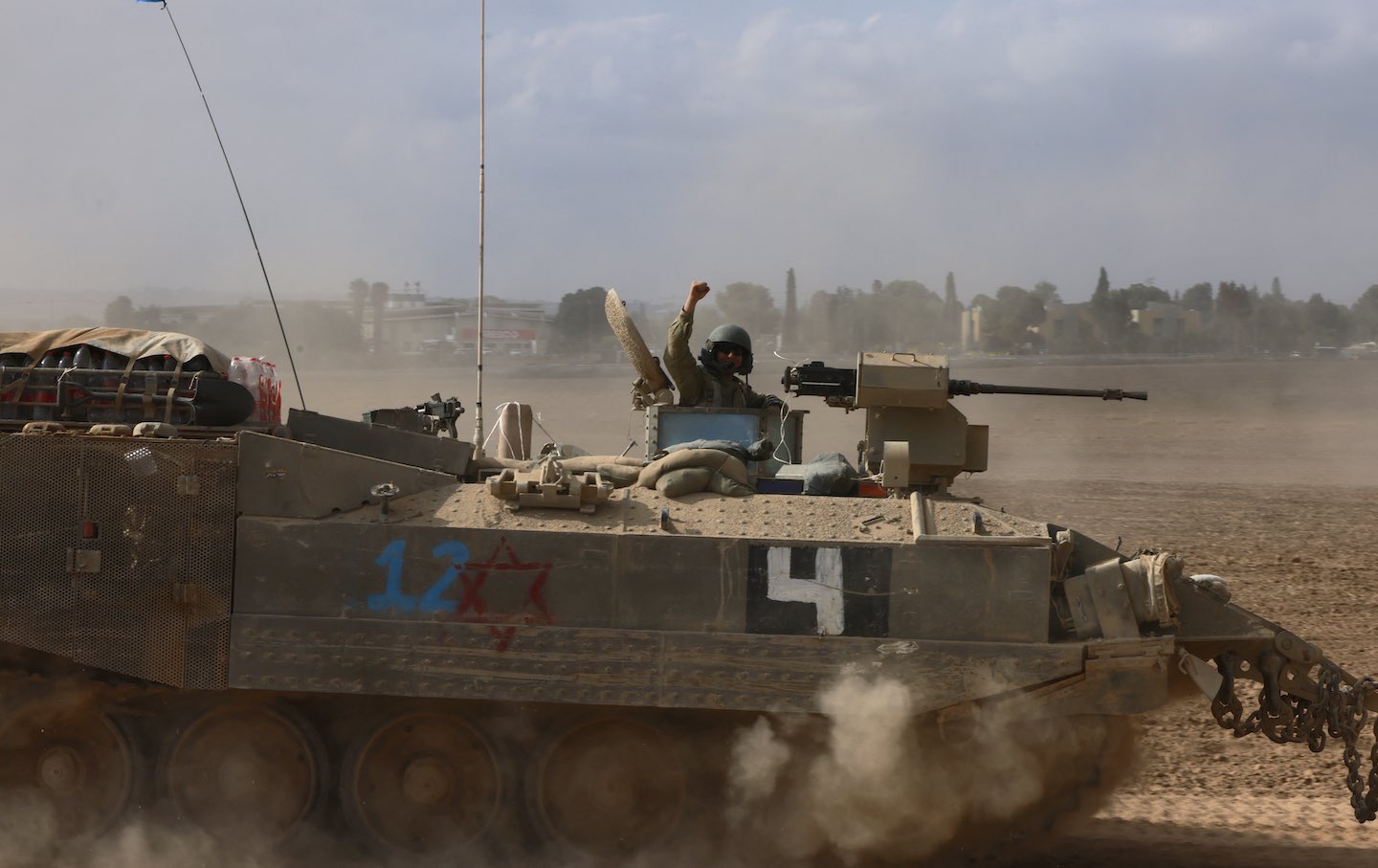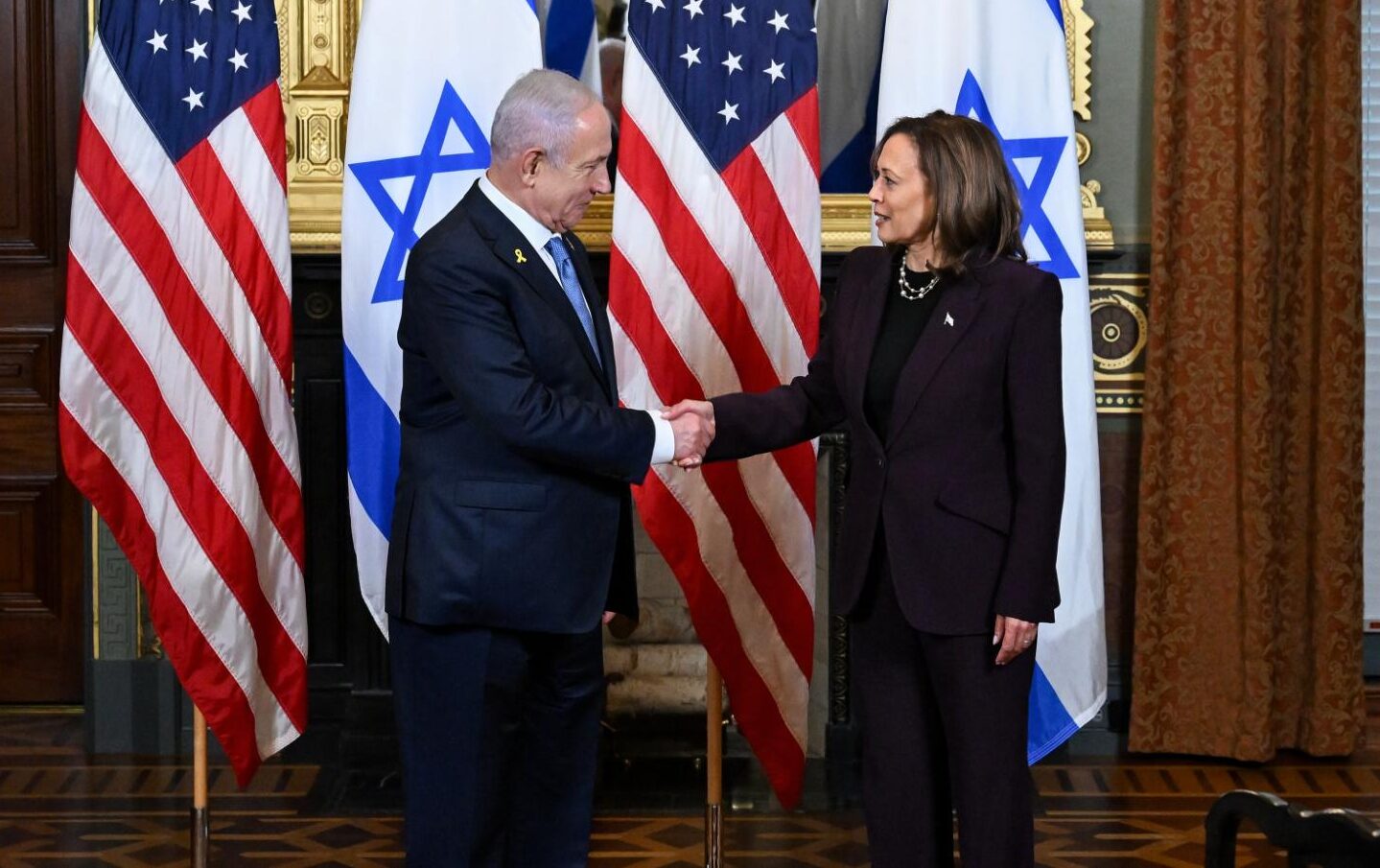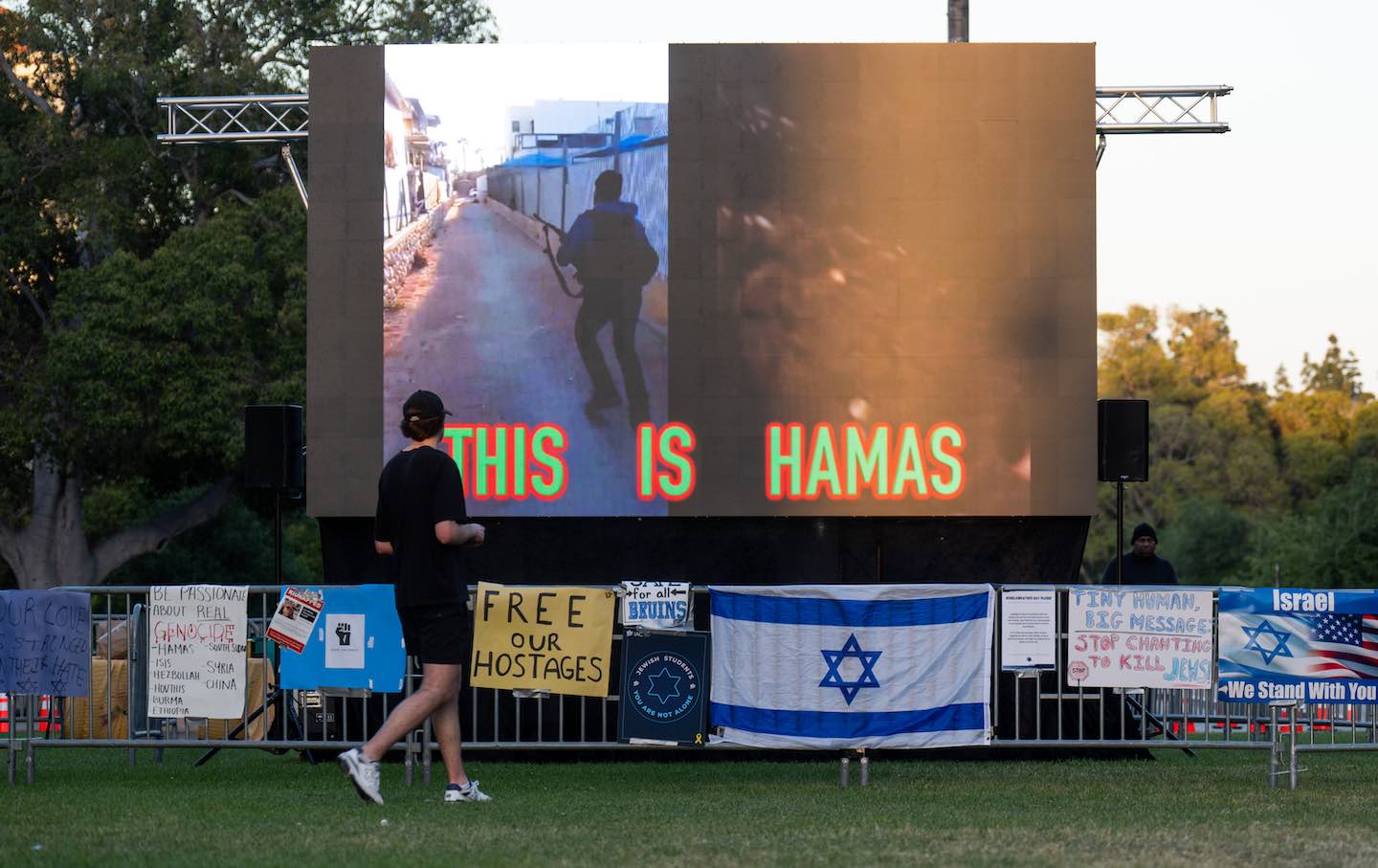Time Is Running Out to Stop the Carnage in Gaza
Given the toll from bombing and starvation, Gaza will soon become the world’s largest unmarked grave. The US has to power to force Israel to change course—but will it use it?

“CROSSING IS PROHIBITED, TRESPASSING OR TOUCHING THE FENCE ENDANGERS YOUR LIFE!” The large orange sign in front of the high-voltage electrified barrier leaves no ambiguity: touch it and die. It sits on a desolate patch of sandy grass in front of a 40-foot-high wall of gray cement, one that extends another 18 feet into the ground and is topped by triple rows of barbed wire, like a crown of thorns. Beyond the electrified fence, the prison walls, and a Kafkaesque assortment of surveillance balloons, armed patrols, tanks, drones, and watchtowers, is the entry point for Rafah, Gaza’s southernmost city.
Today, that entry point, located in Egypt but largely controlled by Israel, has become the gate to Hell: a massive 21st-century concentration camp, crammed with more than a million broken, starved, and ravished humans—babies, children, and pregnant women alongside the sick, elderly, and dying. And one where starving civilians have taken to hunting down stray cats and dogs on the street for food, according to aid agencies who have visited there. In December, the UN projected that the entire population of 2.2 million people in Gaza would face high levels of acute food insecurity by February 2024—“the highest share of people facing this level of food insecurity ever recorded worldwide.”
By late February, with little action taken by the United States or any other country, conditions had deteriorated to the point where, according to the UN, at least 576,000 people in Gaza—one-quarter of the population—were just “one step away from famine.” On February 27, the death toll in Gaza reached a horrific 30,000, mostly innocent women and children. According to many experts, that was likely a significant undercount, due to the difficulty in locating bodies buried beneath collapsed buildings and other rubble. That same day, UN humanitarian coordinator Ramesh Ramasingham told the Security Council that one in six children under the age of 2 in Gaza are suffering from “acute malnutrition and wasting,” where the body becomes emaciated.
Then, just two days later, on February 29, the endless starvation and brutal oppression fused into a powerful explosion that left at least 112 people dead and another 760 injured. The precise sequence of events is still bitterly disputed, but it is clear that at some point Palestinians frantic for food swarmed around the rare aid trucks—and that Israeli tanks opened fire. Among those who were there and saw many bodies was Yehia Al Masri, a medical doctor at Al-Shifa Hospital. “We have reached famine and the situation is beyond description,” he said.
“The Israeli government is using starvation of civilians as a method of warfare in the Gaza Strip, which is a war crime,” reported Human Rights Watch last December. “Israeli forces are deliberately blocking the delivery of water, food, and fuel, while willfully impeding humanitarian assistance, apparently razing agricultural areas, and depriving the civilian population of objects indispensable to their survival.” It is, said the report, “a policy spurred on or endorsed by high-ranking Israeli officials.” The question is, can Israel be stopped before Gaza becomes the world’s largest unmarked mass grave?
The siege began on October 9, when—in the aftermath of the Hamas attacks on October 7—Defense Minister Yoav Gallant publicly announced, “We are fighting human animals.” Therefore, he added, “I have ordered a complete siege on the Gaza Strip. There will be no electricity, no food, no fuel, everything is closed.” Energy Minister Israel Katz issued an order “to immediately cut the water supply to Gaza” while aircraft repeatedly bombed the Rafah gate area, ensuring that no food would enter. Gallant had a well-deserved reputation for wanton violence against the Palestinians of Gaza. An earlier UN investigation found that the military under his command in Gaza carried out a program “designed to punish, humiliate and terrorize a civilian population.”
Soon, more than a million people, at gunpoint and under Israeli threats of death, were forced from their northern towns and villages. “Civilians of Gaza City, evacuate south for your own safety and the safety of your families,” the Israeli military commanded. As many fled on foot with little more than the torn and tattered clothes on their backs, the UN warned that the order would lead to “devastating humanitarian consequences.” Rather than to safety, they were marched into a deathtrap, as Gallant herded his “animals” into Rafah—a small corner of Gaza where day and night the bombs fell, killing hundreds. On the night of February 11, in the span of just hours, Israel conducted heavy airstrikes on Rafah killing at least 67 people and destroying 14 homes and three mosques. Elsewhere, families, including those waving white flags, have been simply murdered in cold blood where they stood.
Those who managed to survive faced severe starvation, resorting to eating grass and drinking dangerously polluted water as the bombs also deliberately targeted bakeries, food suppliers, and water and filtration facilities. And once the electricity was cut and the fuel supply stopped, there would be no food production. Families are “being forced to forage for scraps of food left by rats and eating leaves out of desperation” Save the Children reported on Sunday. “We’re dying slowly,” Asmaa, a mother of four in Gaza, told a reporter from Haaretz. “I haven’t eaten for two days, and I’m thirsty all the time.… There’s no clean water, no power, no gas and no food. We get up every morning and ask whether we’ll die of hunger or from a bomb.”
By January, UN reports indicated that a quarter of Gaza faced “catastrophic conditions,” the highest level of food insecurity, where there is an “extreme lack of food, starvation and exhaustion of coping capacities.” And by late February, more than 12,500 children had been killed by bombs, starvation, and malnutrition. Sixteen more children have died in the past few days due to malnutrition and dehydration in the Kamal Adwan Hospital in northern Gaza. “Now, the child deaths we feared are here and are likely to rapidly increase unless the war ends and obstacles to humanitarian relief are immediately resolved,” said Adele Khodr, the UNICEF director in the Middle East. And Agnes Callamard, the secretary general of Amnesty International, accused Israeli authorities of “engineering famine” in the Gaza Strip. “They knew the likely outcome of their actions but persisted, over weeks and months,” she said.
Hospitals, raided and fired on by Israeli troops, have also largely collapsed. “Infectious diseases are spreading in overcrowded shelters,” said UN relief chief Martin Griffiths. “Famine is around the corner.” And Michael Fakhri, the UN special rapporteur on the right to food, told The Guardian:
“Intentionally depriving people of food is clearly a war crime. Israel has announced its intention to destroy the Palestinian people, in whole or in part, simply for being Palestinian. In my view as a UN human rights expert, this is now a situation of genocide. This means the state of Israel in its entirety is culpable and should be held accountable—not just individuals or this government or that person.”
There is no ambiguity when it comes to the use of starvation as an illegal weapon of war. The Rome Statute of the International Criminal Court declares that intentionally starving civilians by “depriving them of objects indispensable to their survival, including willfully impeding relief supplies” is a very serious war crime. The Nazis used starvation as a key weapon during World War II. Known as the Hungerplan, it began with the forcible starving of Soviet prisoners of war. “Crowded into vast camps without any shelter, 1.3 million died in the four months after the invasion. About 2.5 million had died this way by the end of the war,” noted Alex de Waal, executive director of the World Peace Foundation at the Fletcher School of Law and Diplomacy at Tufts University. Writing in the London Review of Books, de Waal added that “the Hungerplan was a crime comparable in numerical terms to the Final Solution. Indeed, forced starvation was one of the instruments of the Holocaust. Eighty thousand Jews starved to death in the Warsaw Ghetto.”
Facing multiple charges of genocide in the World Court, and now accused of carrying out a forced famine and the systematic starvation of millions of innocent civilians in Gaza, as well as other serious war crimes, Israel must finally be stopped. The first step is to look past the Netanyahu’s government’s constant and cynical use of atrocities committed against Jews in Germany 80 years ago as giving it a license to commit atrocities against Palestinians today.
“The world is still captive to its historic guilt towards Israel without understanding that this is over. The era of the Holocaust has ended,” noted Carolina Landsmann, a columnist for the Israeli newspaper Haaretz. “The Palestinians are now the wretched of the earth. Not Hamas, no one pities Hamas. Thirty thousand dead Palestinians and the destruction of Gaza are the event.”
The only real solution is for the United States to finally end its unconditional offer of billions, bombs, and backing for Israel and replace those diamond-encrusted carrots with sharp sticks: sanctions, boycotts, and isolation.
But as Israel sinks ever deeper in its bloody quagmire, time is getting very short. A Time magazine analysis last January showed a large and rapid decline in support for Israel around the world, dropping globally by an average of 18.5 percentage points between September and December, and decreasing in 42 out of the 43 countries polled. And from a New York Times/Siena poll the same month, it appears that the younger generation of Americans, a group that will one day occupy Congress and the White House, also want little to do with Israel. It clearly showed far greater empathy with the Palestinians (47 percent) than with Israel (26 percent ). Unless Israel begins to quickly and radically reverse course as South Africa did, the Jewish state is rapidly heading to become a pariah state in the eyes of much of the US and the world—if that hasn’t already happened.
Disobey authoritarians, support The Nation
Over the past year you’ve read Nation writers like Elie Mystal, Kaveh Akbar, John Nichols, Joan Walsh, Bryce Covert, Dave Zirin, Jeet Heer, Michael T. Klare, Katha Pollitt, Amy Littlefield, Gregg Gonsalves, and Sasha Abramsky take on the Trump family’s corruption, set the record straight about Robert F. Kennedy Jr.’s catastrophic Make America Healthy Again movement, survey the fallout and human cost of the DOGE wrecking ball, anticipate the Supreme Court’s dangerous antidemocratic rulings, and amplify successful tactics of resistance on the streets and in Congress.
We publish these stories because when members of our communities are being abducted, household debt is climbing, and AI data centers are causing water and electricity shortages, we have a duty as journalists to do all we can to inform the public.
In 2026, our aim is to do more than ever before—but we need your support to make that happen.
Through December 31, a generous donor will match all donations up to $75,000. That means that your contribution will be doubled, dollar for dollar. If we hit the full match, we’ll be starting 2026 with $150,000 to invest in the stories that impact real people’s lives—the kinds of stories that billionaire-owned, corporate-backed outlets aren’t covering.
With your support, our team will publish major stories that the president and his allies won’t want you to read. We’ll cover the emerging military-tech industrial complex and matters of war, peace, and surveillance, as well as the affordability crisis, hunger, housing, healthcare, the environment, attacks on reproductive rights, and much more. At the same time, we’ll imagine alternatives to Trumpian rule and uplift efforts to create a better world, here and now.
While your gift has twice the impact, I’m asking you to support The Nation with a donation today. You’ll empower the journalists, editors, and fact-checkers best equipped to hold this authoritarian administration to account.
I hope you won’t miss this moment—donate to The Nation today.
Onward,
Katrina vanden Heuvel
Editor and publisher, The Nation








